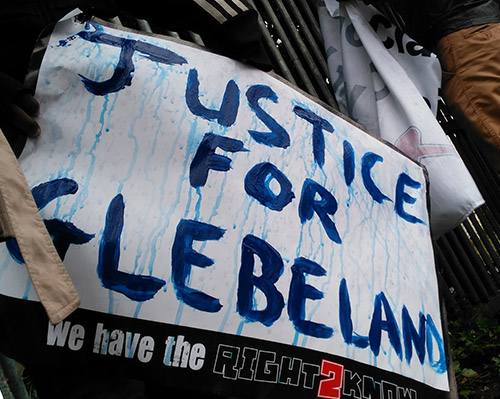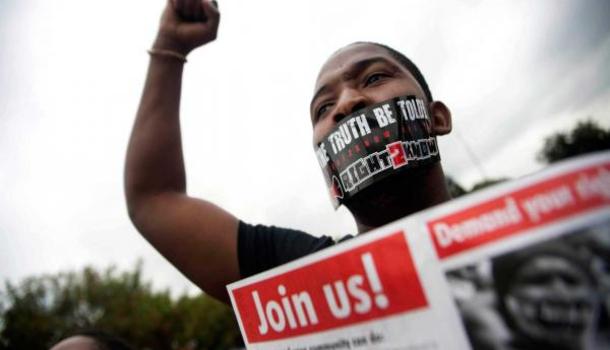Op-ed: What may Xolobeni and Glebelands have in common?
 What may Xolobeni and Glebelands have in common?
What may Xolobeni and Glebelands have in common?
Reflect on universal rights and shared wrongs for a minute-and-a-half this Human Rights Day
MARCH 21 is Human Rights Day.
21 years ago, universally recognised human rights – to freedom, justice, and peace – which formed the basis of our Bill of Rights, became cornerstone to our constitutional and representative democracy, intended to rectify historical violations and ensure dignity, equality and freedom for all.
Or so it says on the parliamentary website.
The site also urges us on this day to: “reflect on our rights and protect those of others.”
The website reminds us of Sharpeville, Nelson Mandela, Pass law protests and that the strength of our Constitution is now such that it is almost impossible for anyone – including the government – to deprive citizens of their basic rights.
So it says.
JOINING THE DOTS
Almost a year ago, on 22 March 2016, Amadiba Crisis Committee leader and Xolobeni anti-mining activist, Sikhosiphi ‘Bazooka’ Rhadebe, was denied his most basic human right – to life.
By that same date, 57 people had already forfeited this right as the lawlessness at Glebelands Hostel tramped over the constitution, ripped up the rule of law and spat on residents’ human rights. To date, 83 people and counting have been denied this most fundamental right and hundreds more their rights to freedom, justice, peace, dignity and equality.
Like the Xolobeni community struggle, where Bazooka’s murder elicited worldwide civil society outrage and served to replace foreign monopoly capital with slightly more visibly politically endorsed local monopoly capital; the ruling party’s hand in all this cannot be underestimated.
On 1 March this year we appealed to progressive organisations, spiritual leaders, civic groups, the media, and concerned individuals, to stand in solidarity with the Glebelands community for the month between 13 March and 13 April. Ironically, Human Rights Day falls within this month.
As we enter a fourth year of unrelenting violence, these dates are significant for on 13 March 2014 it was the state that first violated a Glebelands leader’s human rights when police tortured, humiliated and killed Zinakile Fica using the brutal tubing method – a technique equally popular with apartheid’s security police.
Exactly a month later, on 13 April 2014, the first hostel leader was stripped of his dignity, publicly beaten and violently and illegally evicted from his home. According to his persecutors, who claimed before the police, that the attack – reportedly led by local ANC Women’s League members – enjoyed official sanction, and that “the project can not be stopped until the councilor says so.”
Since then, we have seen the councilor at warlord’s burials and warlords at ANC meetings. eThekwini municipal buses have taken mourners to funerals of hitmen, most of whom were reportedly recruited and armed by Glebelands’ untouchable rogue cop. Private security hired by council have been contracted to gun down residents, political patronage has seen housing supposedly built for the poor, sold or handed out on a less than redistributive basis, while increasingly bloated hostel security budgets for measures which have yet to secure a conviction or in any way reduce the bloodshed, ensure a steady flow of funds to the well-connected – or so sources claim.
RIGHTS VS WRONGS
However, omission sometimes reveals more than deliberate action, and the government’s persistent failure to arrest the lawlessness has tended, with increasing transparency, if not towards the premeditated, then manifestly towards callous indifference. It almost seems as if the state has a stake in Glebelands contract killing.
Hundreds have lost their homes, while murders have spread beyond the hostel to the taxi and trucking industries. Government’s failure has led to the assassination of ANC councilors up and down the KwaZulu-Natal south coast, the killing of rural community members, children and unborn babies, the elderly, many innocent women, whistleblowers, breadwinners, key witnesses, and community leaders. It has also been linked to the proliferation of other crimes including, but probably not limited to: hijacking, torture, unlawful arrest, armed robbery, extortion, rape, intimidation, arson, the trade in unlicensed firearms, ammunition and stolen goods, assault, bribery, corruption and defeating the ends of justice – all often unreported because no one trusts the police anymore.
Yet in all this time, not one murderer has been sentenced, no action has been taken against state torturers and not one of the hundreds of vulnerable people violently and illegally evicted have been assisted by government after being left homeless and destitute allegedly by politically-favoured hostel thugs.
We have witnessed the utter collapse of law and order lead to widespread human and constitutional rights violations on a scale unprecedented since the so-called birth of democracy and promulgation of the Bill of Rights. This is happening right here in our own backyard, not in some country at war.
Yet despite complaints made via every possible channel (including to the United Nations Human Rights Council) the crisis continues to elicit almost no response, concern or outrage. The Glebelands community has concluded this must be because they are mere hostel dwellers without means to access or enforce their rights, and that it is more comfortable for the public to ignore or absorb the government’s lies regarding the causes, effects and perpetrators of this untenable situation, rather than engage with its awful reality.
THE XOLOBENI CONNECTION
When Bazooka Rhadebe was killed a year ago, his killers’ modus operandi bore striking resemblance to those of Glebelands’ hitmen. Reliable sources have now claimed that of those believed to have been involved in Bazooka’s high profile murder is a much-feared Harding taxi boss, a regular at Glebelands with hostel hitmen on his payroll.
Rumour has it the Harding suspect, apparently arrested in January after hostel-related tipoffs, was found in possession of a large number of unlicensed rifles and handguns. Sources suggest this arsenal may have been supplied by none other than Glebelands’ own rogue cop, the seemingly untouchable Durban Central SAPS detective.
It has been alleged that, amongst other combined operations, they plotted the hit on Glebelands Block 52 Peace Committee leader, Nkosinathi Shezi, after he left the Umlazi Magistrate’s Court on 7 November 2016.
It is therefore quite possible that Glebelands hired guns helped kill Bazooka. And if sources’ claims indeed prove correct, then it also appears highly likely that this investigation, seemingly like so many of Glebelands’, may, with the help of a hefty donation to investigating officers and their superiors in the feeding frenzy, be gently eased into the bulging docket marked “insufficient evidence” and thus ensure the smooth passage of allegedly politically connected killers through the revolving doors of justice. Case closed.
It has of course been impossible to verify any of this for although the SAPS routinely urges communities to “work with the police,” rarely will police “work with the community,” especially if some of the criminals have badges.
It is clear that the Xolobeni, Glebelands, and other community struggles across the country are linked by a common evil that can only be overcome by grassroots unity and working towards the common good buried somewhere in our Constitution.
Many Glebelands community members, with rural roots in the Eastern Cape, especially those with friends or family at Xolobeni and Mbizana, were deeply disturbed by Bazooka’s murder and pointed to longstanding parallels in police conduct, lack of consultation, political arrogance, disregard for basic rights and the often tragic fate of communities engaged in vastly unequal struggles against power.
REFLECTING ON 84
This Human Rights Day we appeal that you take a second’s silence for each of the 83 people – 84 in case Bazooka’s murder is conclusively linked to Glebelands hitmen – denied their most fundamental of all human rights – the right to life – as a result of government’s failure to resolve, or its apparently active promotion of and / or possible benefit from, this unconscionable tragedy.
Parliament’s website calls on us this Human Rights Day, to “remain vigilant to abuse.”
Human rights are inextricably linked to freedom from abuse of state and corporate power and the freedom and support mechanisms to effectively expose it and hold it to account when such abuse occurs.
The courts have increasingly become the only remaining mechanism with which to uphold constitutional obligations, accountability and ensure respect for human rights. For the overwhelming majority therefore, the most basic rights remain as remote as ever, regardless of what the parliamentary website tells us.
So hold that thought for 84 seconds before buying into the next @MYANC fake newsfeed on the health of our ‘constitutional democracy’ and the majority’s ability to exercise their most basic human rights.
#HOSTELLIVESMATTER #JUSTICE4BAZOOKA
ISSUED BY:
Vanessa Burger
(Independent Community Activist for Human Rights & Social Justice)
Email: bhubesi069@gmail.com



